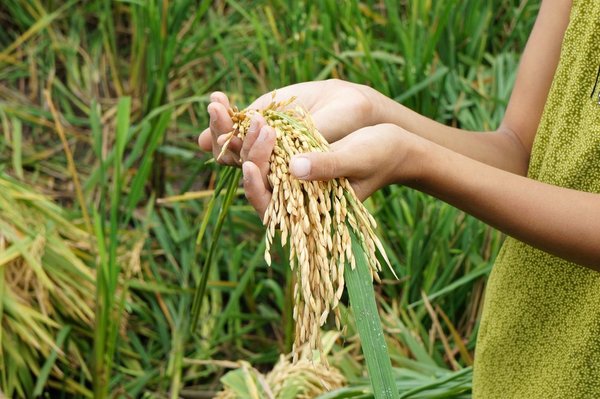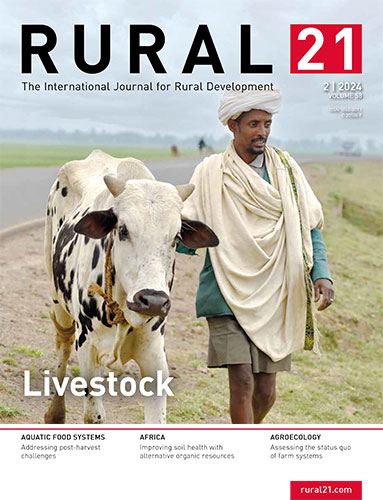 Read this article in French
Read this article in French- Share this article
- Subscribe to our newsletter
Civil society with a clear vision for the “Policies against Hunger Conference”
This year’s PaH was dedicated to the 20th anniversary of the UN Voluntary Guidelines on the Right to Adequate Food. With support from the German Institute of Human Rights and Heinrich Böll Foundation, international CSOs working on the right to food (many of them from the Global South) took this opportunity and held a pre-conference to exchange and strategise on key messages for a future realisation of the right to food.
CSOs identified the voluntary guidelines as fertile ground for the further strengthening of the right to food. Since their adoption, the UN Committee on World Food Security (CFS) has put them at its centre, and they formed the basis for today’s advanced normative framework on the right to food, including the Voluntary Guidelines on Tenure (VGGT) or the UN Declaration on the Rights of Peasants (UNDROP).
The persistent global food crisis, with 2.4 billion people being food insecure, and the underlying structural inequalities (e.g. growing concentration of control over land, water and seeds) highlight the urgent need for a rights-based approach. Thus, for the future success of the right to food, CSOs see social participation as key.
Social participation must be the main principle
Many of the people most affected by hunger stand at the forefront of our food systems – Indigenous people, peasants and small-scale farmers, pastoralists, women, landless workers and fisher folk. It is they who have the best understanding of local problems and their solutions. Therefore, their inclusion into decision-making processes must be the cornerstone of the right to food future agenda. For its success, participatory bodies, such as food councils, need a clear mandate, decision-making power and government budgets.
Learning from Brazil
In contrast to the German situation, all of the above are part of Brazil’s national food policy council CONSEA – the most inclusive body in political decision-making at national level world-wide. To minimise conflicts of interest, CONSEA excludes the private sector. This rights-based approach, which puts rights-holders and duty bearers at the centre, should be taken up not only by the German government and all UN member states but also by the multilateral system as a whole. For corporate capture and the rising influence of companies as well as philanthropic foundations emerging from these companies to save taxes and to disguise political influence for the ultra-rich owners are threatening justice and equality in food systems.
The German Federal Ministry of Food and Agriculture (BMEL) has taken a first step in the right direction by prominently featuring CONSEA at the PaH. Now the German government needs to take up its learnings and implement them. At the same time, together with allies like Brazil and the European Union, it has to continue and even further strengthen its support for the CFS as the most inclusive platform within the UN.
Agroecology and food sovereignty as the way forward
The principles of agroecology and food sovereignty were identified as other important pillars for the future agenda. Contrary to the common belief that agroecology merely describes organic cultivation methods, it is a holistic and people-centred approach, integrating innovative organic food production with the socio-political organisation of food systems. As a pivotal part of the advanced normative framework on the right to food, agroecology and food sovereignty are enshrined in UNDROP. They promote agro-biodiversity and guarantee access to and control over land, water and seeds to those who produce the food that feeds local and regional communities.
Therefore, CSOs demand that the UN Food and Agriculture Organization (FAO) adopt agroecology as a major pathway to the realisation of the right to food. To strengthen this process, more public investments should sustain the FAO concerned divisions, such as the right to food unit. Additionally, the FAO should promote market regulations as a means for people’s food sovereignty and fair world trade.
Realization of the right to food requires assertive accountability mechanisms and political coherence
Impunity of those responsible for the violation of the right to food must end. The CSOs partaking in the PaH demand that laws and regulations must integrate the right to food. Such legal aspects then become an important pillar for social struggles, when right to food violators can be held accountable. At the PaH, this so-called justiciability of the right to food was also identified as a key pillar for the future agenda for the right to food.
Finally, the (threefold) state obligation to respect, protect and fulfil the right to food must be a central principle for decisions made in every political field – be it in regard to food and agriculture, humanitarian law, health, social security, housing, education, trade or others. It is only in this way that the human right to adequate food can be fully realised.
Author: Jan Dreier, FIAN Deutschland, contact: j.dreier@fian.de





Add a comment
Be the First to Comment